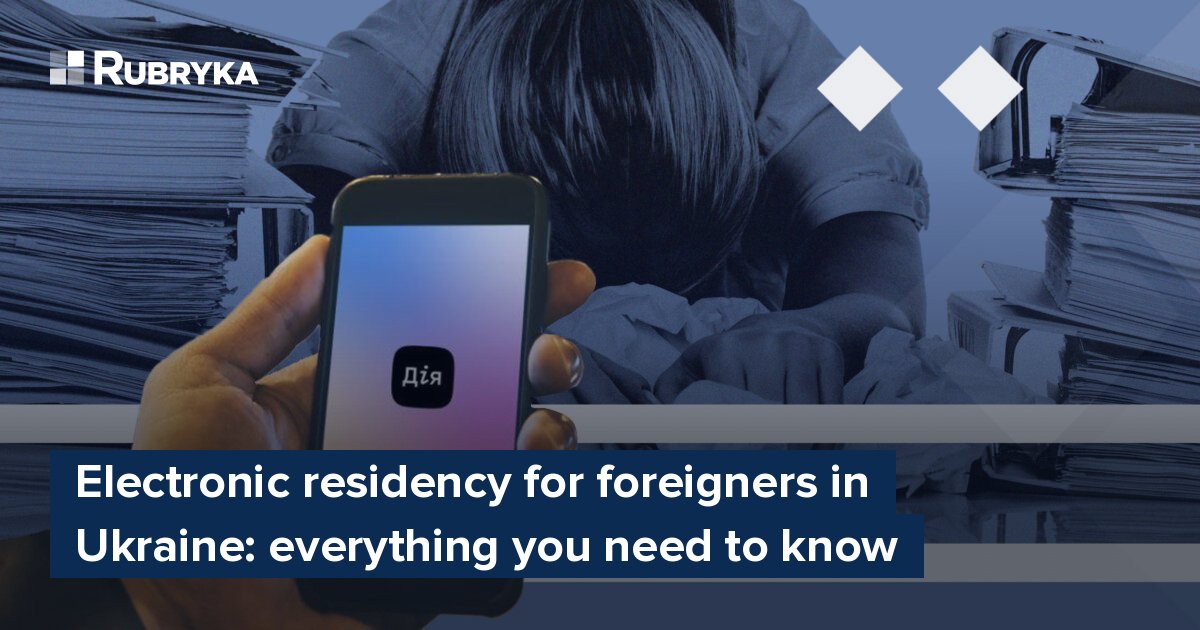
What is the problem?
Previously, foreigners who wanted to do business in Ukraine had to go through a complex bureaucratic procedure. All this, of course, took a lot of time and money. That was all before April 1, 2023, when Ukraine opened e-residency to foreign citizens. The concept has been in the works for two years, and changes have now been made to the tax legislation. In Ukraine, just like in Estonia or Lithuania, foreigners can get e-resident status.
What is the solution?
E-residency is a special status that allows a foreigner to conduct business activities in Ukraine completely online. E-residents can remotely:
- manage a business;
- open bank accounts;
- sign documents with an electronic signature;
- pay taxes on preferential terms.
It is also worth understanding that an e-residency differs from a temporary or permanent residence permit in Ukraine. It does not give a person the advantages they could get when founding their own company in Ukraine. Still, it makes Ukraine more attractive for doing business.
The e-resident status is indefinite, provided that the person meets the criteria outlined in the law. Yaroslav Zheleznyak, deputy chairman of the Committee on Finance, Tax, and Customs Policy, explained how e-residency works:
The specialist registers with Diia, Ukraine's digital governance app, and undergoes a financial and security check. If everything checks out, they become an electronic resident — an electronic payer of the single tax on the third group without VAT and receive an electronic digital signature.
They can then open a bank account remotely, and the bank will act as the tax agent for the e-resident. According to Ukrainian law, the specialist works and pays tax — 5% of income being the individual entrepreneur of the third group, with the upper limit being 15%. However, it concerns only external contracts with the export of services. All documents are electronic, all correspondence with the State Tax Service is online, and all payments are cashless.

Diia is an application created by Ukraine's Ministry of Digital Transformation in which all the necessary documents are in one place on your smartphone.
Who can get e-resident status?
Non-Ukrainians aged at least 18 years old can obtain e-resident status, except for those who:
- have the right to permanent residence in Ukraine, i.e., have been issued with a corresponding permit;
- are tax residents of Ukraine;
- are stateless persons;
- have income from any type of activities on Ukraine's territory (except passive income, for example, dividends from a Ukrainian company).
E-residents in Ukraine cannot be those who live or are permanently in a state included in a list, which the Ministry of Digital Transformation will later create. There is no clear list yet, but it is known that it will include countries that are:
- recognized as an aggressor state or an occupying state in relation to Ukraine;
- included in the Financial Action Task Force (FATF), the international standard-setting body for anti-money laundering (AML), countering of the financing of terrorism (CFT), and countering proliferation financing (CPF) black or gray list;
- defined by the European Commission as countries with weak regimes for preventing and countering the legalization (laundering) of proceeds of crime, the financing of terrorism, and the financing of the proliferation of weapons of mass destruction.
How can an e-resident start a business??
- 1. Apply through the E-resident information system. This is part of the Diia state portal, but is still being finalized.
- Pass identification and receive a qualified electronic signature (QES). This procedure is also not yet complete — the law assigns the government the task of defining the identification procedure and the procedure for acquiring and canceling the e-resident status, providing foreigners with access to qualified electronic trust services, and functioning of the information system.
The procedure should be free of charge. At least, the law does not provide for the need to pay any fees for applying for e-resident status, unlike in other countries. For example, in Estonia, applying for e-resident status costs €100-130.
3. Open a bank account. It will also be possible through the information system, which is currently not working. One can open an account in one bank only.

Diia app allows to get all public services online quickly and conveniently.
How and how much taxes must e-residents pay?
Currently, the law offers foreigners who have received the e-resident status only one option — to register as an individual entrepreneur of the third group, who are payers of a single tax of the simplified taxation system. An e-resident does not need to submit a separate application for a simplified taxation system. Such entrepreneurs pay a 5% income tax if their annual income does not exceed ₴7,818,900 and 15% if their income is higher.
Banks will be the tax agents of e-residents. Ukrainian entrepreneurs could envy this system since the resolution of tax issues of e-residents is the responsibility of the bank chosen by them. Institutions will independently:
- withhold the amount of tax when funds are credited to the e-resident's account;
- pay tax to the budget within two working days;
- submit to the controlling authorities the calculation of the amounts of the e-resident's income and the tax withheld from them.
The absence of the need to pay taxes and submit reports significantly simplifies conducting business for an e-resident.
What activities can e-residents perform?
The pilot project does not yet allow registering a legal entity, but the developers of the project do not reject this idea, so e-residency 2.0 may include the option of registering a limited liability company (LLC) based on a model statute. Initially, e-residency was provided for a limited range of activities focusing on IT specialists, but these restrictions were removed.
Currently, e-residents can:
- provide services;
- manufacture or sell goods exclusively for the benefit of non-residents of Ukraine.
What to pay attention to?
Lawyers emphasize that e-residents need to carefully study the provisions of the relevant conventions on the avoidance of double taxation between Ukraine and the state of tax residency so that the income received by the e-resident in Ukraine is not taxed twice.







